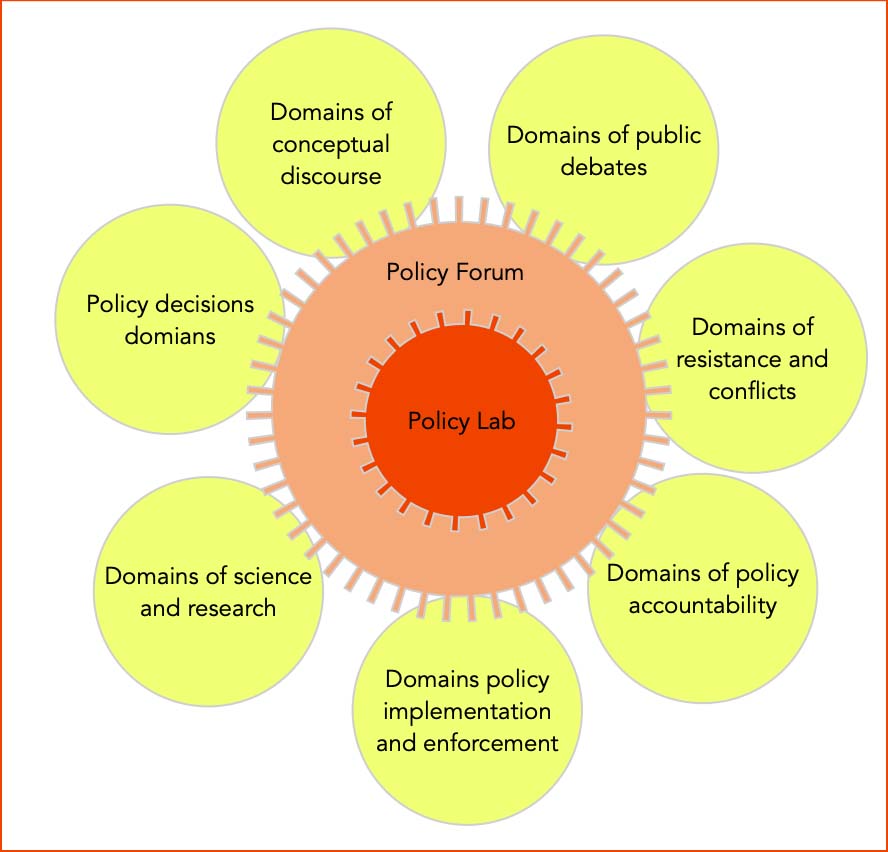What is water Policy Lab?
Water crisis cannot be ignored. Numerous reports have established that water future of the humanity and entire the planetary system is at risk. Two main reasons for this are: 1) climate change and 2) increasing demand for water everywhere for expanding economy and growing population. The crisis is real: over two billion people live in countries experiencing high water stress (United Nations 2019) and nearly four billion people experience severe water scarcity at least one month of the year (Mekonnen and Hoekstra 2016).
Knowing the problem and prescribing scientific solutions not enough. Effective response requires not just one-way translation of science into policy and decisions, but an interactive process of learning, deliberation, and adaptive management. Representation of non-scientific knowledge and incorporating the voices of marginalised people are critical to successful climate risk management for water security. Evidence suggests that much of the current efforts to manage climate risks are exceedingly technical and science driven, while too often ignoring the voices of the community and knowledges of the practitioners. There is a need to promote co-production of knowledge, practice, and policy.
Contextual approach necessary. Every local and national context of water insecurity and climate risk is unique. There is thus a need for a contextual approach to target specific risks resulting from vulnerability condition, hazards, and exposure. In order to support contextual approaches, a region (international) or a country can be segmented into various socio-ecological zones in terms of water security risks, the underlying political economy, and the political opportunity for catalysing change. For instance, Himalayan South Asia is different from Pacific island countries on these parameters. Risks, responses and the capacity to respond vary across different countries, socioecological zones, and communities. Hence, a more differentiated approach to risk management, partnership development, and policy solutions is required to accurately target the realities of different zones. However, a localised approach alone is not enough – local actions need to be simultaneously connected to higher-scale processes of risk management planning and policy at national, transboundary, and regional levels.
What is Water Policy Lab? Water Policy Lab is a an approach to catalyse dialogues among actors engaged in various domains of water management, research, practice, and policy in specific geographic and policy contexts, with a view to generate actionable solutions to problems concerning current or future water security. As graphically portrayed in the diagram, Water Policy Lab (WPL) creates an opportunity to diverse actors to come together and share their perspectives on a particular problems, and also articulate solutions based on their stakes and knowledge. Here actors are encouraged to enter a room with open mind to listen to others and learn different ways of understanding problems and articulating solutions. The emphasis is on dialogue and less on advocacy, informed by research as well as practical, indigenous and policy oriented knowledge. It is a forum convened by practice oriented researchers or research oriented practitioners – who have the ability to understand and communicate case specific problems and solutions as well as generic and more abstract principles underpinning solutions.
What are the important dimensions or domains of Water Policy Lab? At least seven different domains of a specific water management problem are identifiable and it is important that all or most of these are represented in the Policy Lab process. These domains include:
- Domains of conceptual discourse – such as the one related to the work of historians, geographers, political analysts
- Domains of research and scientific analysis – involving researchers and scientists involved in understanding the problem, predicting future and drawing on policy and practical implications of their research
- Domains of public debates – such as media, activist opinions, political leaders
- Domains of resistance and conflicts – such as active physical resistance or overt or covert conflicts around particular water resources systems or management practices
- Domains of policy decision making – those who draft, endorse or decide policies
- Domains of accountability – include state agencies such as the parliament and their working groups, constitutional bodies, and election manifestos of the political parties in democratic system
Does Water Policy Lab work in practice? We have tested this approach in various sectors of natural resources management including water and forests.
For example, we have worked with Southasia Institute of Advanced Studies (SIAS) to apply Water Policy Lab methodology to understand and propose actionable solutions on urban water challenges in Nepal Himalayas. Please click the link to see the Policy Lab Report. This was also published and circulated in the local language.
The report has also been published at World Water Policy Journal for wider audience beyond Nepal.
There are numerous examples of more generic version of policy lab known as Policy Dialogues (see resources below).
Citation for this note: IFSD (2021). Water Policy Lab: A Framework for Action, Institute for Study and Development Worldwide, Sydney, Australia.
If you want to know more about the Water Policy Lab tool, please contact us at: info@ifsd.com.au

Expression of Interest for participation in International Water Policy Lab Forum – I
16 July 2021
6.00 pm to 7.30 pm AEST, Australia
9 am to 10.30 am CET, Europe
8 am to 9.30 am GMT, UK
The goal of the Policy Lab Forum is to catalyse such change by focussing on creating innovative models of co-production of knowledge and co designing and cocreating sustainable water management solutions for securing our water future for everyone today and tomorrow.
If you are concerned that not enough is being done now to harness the power of interactive learning across science, policy and practice in the water space, and want to be part of the change to foster co-production, then this Water Policy Lab forum is for you.
We invite you to join this virtual Forum – and below is some additional information on it.
Please register your interests here
Register for Water Policy Lab (WPL) Forum – II
18 November 2021
6.00 pm to 8.00 pm AEST (Australia)
12.30 pm to 2.30 PM, IST (India)
12.45 pm to 2.45 pm (Nepal)
9.00 am to 11.00 am CET (Europe and Botswana)
7 am to 9.00 am GMT (United Kingdom)
Click to Register for WPL Forum II
The goal of the Policy Lab Forum is to catalyse such change by focusing on creating innovative models of co-production of knowledge and co designing and co-creating sustainable water management solutions for securing our water future for everyone today and tomorrow.
If you are concerned that not enough is being done now to harness the power of interactive learning across science, policy and practice in the water space, and want to be part of the change to foster co-production, then this Water Policy Lab forum is for you.

